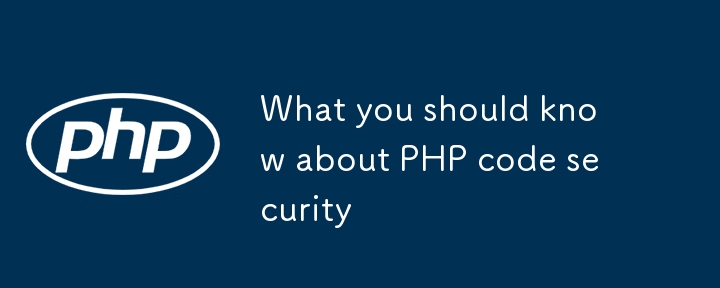
在 Web 开发方面,PHP 是一种广泛使用的脚本语言。随着 PHP 的流行,了解与 PHP 相关的潜在安全风险以及缓解这些风险的措施至关重要。无论您使用 WordPress 部署 CMS 应用程序还是使用 Laravel PHP 框架构建企业应用程序,PHP 安全性的重要性以及一些值得注意的 PHP 解释器漏洞的业务影响对于开发人员来说至关重要。
为什么防范 PHP 安全漏洞很重要?由于 PHP 的流行和广泛使用,PHP 经常成为黑客和恶意实体的目标。由于各种原因,例如不良的编码实践、缺乏对用户输入的清理以及过时的版本,安全漏洞可能会蔓延。
例如,让我们考虑在 SQL 查询中使用未经净化的用户输入的场景。这可能会导致 SQL 注入,这是一个常见的漏洞。
在给定的代码中,恶意用户可以操纵URL中的id参数来执行SQL注入。为了防止这种情况,清理用户输入至关重要,例如使用 mysqli_real_escape_string 或准备好的语句:
PHP 应用程序中的安全漏洞可能会对您的业务产生深远的影响。它们可能会导致数据泄露,进而可能因不遵守 GDPR 和 CCPA 等数据保护法规而导致巨额罚款。违规行为还会削弱客户的信任,导致业务损失。此外,修复漏洞的补救成本可能很高,特别是如果它们是在开发生命周期的后期发现的,这就是为什么从项目一开始就将安全性作为优先事项至关重要的原因。
始终验证和清理用户输入。使用带有参数化查询的预准备语句来防止 SQL 注入。使用最新版本的 PHP 及其框架,因为它们附带针对已知漏洞的安全补丁。定期使用 Snyk 等工具扫描代码和应用程序依赖项以及云基础设施配置是否存在漏洞。遵循安全编码实践。
PHP 安全性至关重要,因为易受攻击的 PHP 应用程序可能会导致数据泄露、失去客户信任和监管罚款。由于 PHP 经常用于开发 Web 应用程序,因此它经常成为攻击者的攻击目标。确保您的 PHP 代码安全有助于保护您的用户数据和您的业务。
PHP 漏洞扫描器是一种自动扫描 PHP 代码中已知安全漏洞的工具。示例包括 Snyk 和 Composer 的内置安全检查器。这些工具可以帮助您识别并修复 PHP 应用程序中的安全问题。
PHP 安全公告是关于 PHP 组件中的安全漏洞的公开公告。它提供了有关该漏洞、其潜在影响以及修复方法的详细信息。 PHP.net 和其他 PHP 相关网站经常发布这些建议。 Snyk 还维护一个基于 Composer 包管理器的 PHP 安全建议数据库。
让我们探索一些常见的 PHP 安全漏洞,并了解有用的开发人员安全资源来缓解这些漏洞。
Cookie 和会话是 Web 开发的基本方面,使我们能够在请求之间维护状态。然而,如果管理不当,它们可能会带来严重的安全缺陷。
在 PHP 中,尤其是在使用像 Laravel 这样的 Web 框架时,在管理身份验证时保护 cookie 和会话数据非常重要。这里有一些提示:
在 Laravel 中,您可以在 config/session.php 文件中设置这些配置:
请参阅更多有关保护 Laravel 应用程序的 Web 安全指南,以帮助防范 PHP 安全漏洞。
SQL 注入是一种代码注入技术,攻击者利用该技术来利用 Web 应用程序的数据库查询中的漏洞。它可能导致未经授权访问敏感数据以及潜在的数据操纵或删除。
考虑以下易受攻击的 PHP 代码:
$id = $_GET['id']; $result = mysqli_query($con, "SELECT * FROM users WHERE id = $id");
An attacker can manipulate the id parameter in the URL to alter the SQL query. To prevent this, use prepared statements:
$stmt = $conn->prepare("SELECT * FROM users WHERE id = ?"); $stmt->bind_param("s", $_GET['id']); $stmt->execute();
For more on SQL injection and PHP security, check out this free PHP security education.
Code injection is another common vulnerability where an attacker can inject and execute arbitrary code within your application. In PHP, this often occurs when user input is passed into the eval() function or system calls without proper validation or sanitization.
Let's consider the following use case in the context of a PHP Laravel project, where a developer faced a challenge while attempting to dynamically generate an image URL within a Blade template. The goal was to display an image whose path was constructed using variable content and Laravel's URL helper function. To achieve this, the developer used PHP's eval() function as follows:
php eval("\$image_url = \"{{ url('public/uploads/trust/".$value.".jpg') }}\";"); ? 
The developer's intention was to create a flexible way to generate image URLs based on the $value variable. However, the use of eval() raises significant security concerns, such as:
The developer could have used a more secure and maintainable approach by using Laravel's Blade templating engine to generate the image URL:
 }})
This method avoids the use of eval() altogether, leveraging Laravel's built-in functionalities to securely generate dynamic content. Make sure you read about more ways to prevent PHP code injection.
One often overlooked area of application security is third-party dependencies. In PHP, we use Composer to manage these dependencies. It's crucial to regularly check your dependencies for known security vulnerabilities.
You can use tools like Snyk to automatically scan your Composer dependencies for known vulnerabilities. Here's how you can install and use Snyk:
npm install -g snyk snyk test
When running the snyk test command in the root directory to test your Composer dependencies for security vulnerabilities, you might see output like this:
Testing /path/to/your/laravel-project/composer.lock... ✗ High severity vulnerability found in symfony/http-foundation Description: Arbitrary Code Execution Info: https://snyk.io/vuln/SNYK-PHP-SYMFONY-174006 Introduced through: symfony/http-foundation@5.4.0 From: symfony/http-foundation@5.4.0 From: symfony/http-foundation@5.4.0 > symfony/http-foundation@5.4.0 From: symfony/http-foundation@5.4.0 > symfony/http-foundation@5.4.0 > symfony/http-foundation@5.4.0 From: symfony/http-foundation@5.4.0 > symfony/http-foundation@5.4.0 > symfony/http-foundation@5.4.0 > symfony/http-foundation@5.4.0 Fix: Upgrade to symfony/http-foundation@5.4.1 Tested 123 dependencies for known vulnerabilities, found 1 vulnerabilities, 122 vulnerable paths.
I highly recommend reading more on testing your PHP Composer dependencies for security vulnerabilities with Snyk.
Even if you follow secure coding practices, vulnerabilities in the PHP interpreter itself can expose your applications to risks. For instance, multiple vulnerabilities were reported in the Debian PHP8.2 package, which you can view in the Snyk database.
Some of the notable PHP interpreter vulnerabilities include:
These vulnerabilities could allow an attacker to execute arbitrary code or cause a DoS (Denial of Service). So, it is essential to keep your PHP version updated and frequently check for any reported vulnerabilities in the PHP interpreter you are using.
Snyk is a powerful developer-first security platform that helps developers identify and fix security vulnerabilities in their PHP applications. It provides an extensive database of known vulnerabilities and can automatically scan your project for these issues. Snyk also offers automated fix PRs, which can save developers significant time in fixing identified vulnerabilities.
There are several common PHP vulnerabilities that developers should be aware of. These include:
One way to stay updated on PHP interpreter vulnerabilities is to connect your Git repositories to Snyk, which will automatically monitor your dependencies for vulnerabilities and notify you of any new vulnerabilities that are reported. Specifically, you might be deploying your PHP applications using Docker and other containerization technology, and it's crucial to monitor your container images for vulnerabilities because these Docker container images bundle the PHP interpreter and other dependencies that could be vulnerable.
If you're using Docker, you can use Snyk to scan your Docker container images for known vulnerabilities by running the following:
snyk container test your-docker-image
Make sure to follow James Walker's best practices for building a production-ready Dockerfile for PHP applications and Neema Muganga's Securing PHP Containers guide to secure your PHP container images.
Protecting against PHP security vulnerabilities should not be an afterthought but an integral part of your development process. It involves secure coding practices, regular updates, and vigilance for any reported vulnerabilities in the PHP ecosystem.
To learn more about PHP security, you can follow online tutorials on the Snyk blog and take free online byte-sized lessons on Snyk Learn. Websites like OWASP also provide extensive resources on web application security, including PHP.
以上是关于 PHP 代码安全性您应该了解的内容的详细内容。更多信息请关注PHP中文网其他相关文章!




